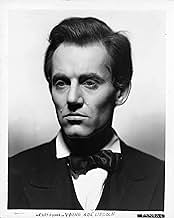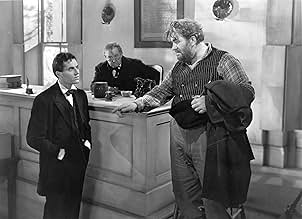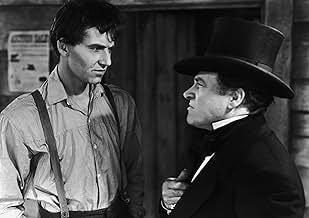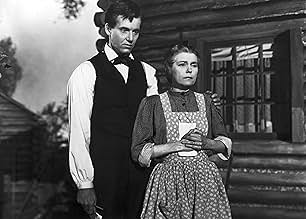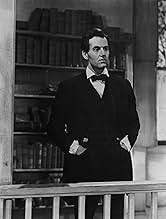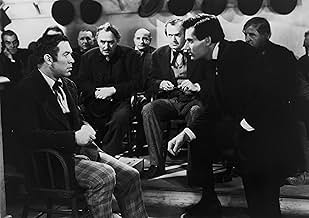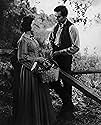Füge eine Handlung in deiner Sprache hinzuA fictionalized account of the early life of the American president as a young lawyer facing his greatest court case.A fictionalized account of the early life of the American president as a young lawyer facing his greatest court case.A fictionalized account of the early life of the American president as a young lawyer facing his greatest court case.
- Für 1 Oscar nominiert
- 6 Gewinne & 2 Nominierungen insgesamt
- Carrie Sue
- (Nur genannt)
- Man with Lynch Mob
- (Nicht genannt)
- Townsman Dancing at Party
- (Nicht genannt)
- New Salem Townsman
- (Nicht genannt)
- Carrie Sue
- (Nicht genannt)
- Peach Pie Baker
- (Nicht genannt)
- Loafer
- (Nicht genannt)
Empfohlene Bewertungen
Maybe that's why I love it. You can see Ford coming to terms with the grand, Griffithesque vision of America through its most complicated avatar, Lincoln. Ford's love for his country was more like Lincoln's than Griffith's, anyway: like Lincoln, he acknowledged the genius of the democratic experiment, but he was also aware of its dangers: mob rule and self-satisfaction. YML's greatest scenes are all about this.
First, there's the local parade Abe attends, surrounded by yahoos whom he loves but also sees for what they are. (We see him in another scene accepting a legal case from one of these -- and warily biting the coin offered him for a retainer.) Veterans of the recent War of 1812 and Indian Wars march through; the crowd is wild for them, Abe merely respectful.Then a agon of old men in tricorners is pulled through the parade route. No one seems to know who they are. Lincoln quietly informs his friends that they are veterans of the War for Independence -- and gravely doffs his stovepipe hat. His friends, mildly ashamed (it appears) of their prevous jingoistic glee, follow suit, and stand silent and hatless as the old men pass.
Then the mildly ludicrous plot -- about two brothers accused of another man's murder -- kicks in, and Abe goes to work. The scene where he confronts a lynch mob, putting his foot up against the log they're using for a battering-ram against the jailhouse door, is a classic by any standard. But note how Abe talks to the mob on its own level while remaining, in spirit, resolutely on his own higher plane. After appealing to their macho impulses by offering to "lick any man here," he delivers a house-divided speech that soothes their savagery and leaves them confused and irresolute. "Dontcha wanna put that log down now, boys?" he asks when they have been flummoxed by his eloquence. "Ain't it gettin' a mite heavy?"
Throughout Ford indulges in shameless historical foreshadowings that would have made Stephen Vincent Benet blush. Abe meets Mary Todd and Stephen Douglas; he rides down a dirt road with a bumpkin who's playing a new tune called "Dixie" on a jaw-harp. "Kinda makes you feel like marchin'!" says the bumpkin, as he and Abe ride through a muddy patch in the road.
The ending is impossible to describe without inviting derision, but I swear to you, it works. Having won his case, Lincoln allows as how he might take a walk -- "maybe to the top of that hill." As he trudges on, the skies send down rain and lightning -- and Abe seems to know what this is a prelude to.
I acknowledge the superiority of the great Ford films that came after, but I will always have a special place in my heart for "Young Mr. Lincoln." Independence Day (the federal day of observance, not the movie) is coming; you could do far worse than to watch this great film before the barbecue.
John Ford before the shooting starts put him at ease by saying he wasn't going to be playing the Great Emancipator, but just a jack-leg prairie lawyer. That being settled Fonda headed a cast that John Ford directed into a classic film.
This is not a biographical film of Lincoln. That had come before in the sound era with Walter Huston and a year after Young Mr. Lincoln, Raymond Massey did the Pulitzer Prize winning play by Robert Sherwood Abe Lincoln in Illinois. Massey still remains the definitive Lincoln.
But as Ford said, Fonda wasn't playing the Great Emancipator just a small town lawyer in Illinois. The film encompasses about 10 years of Lincoln's early life. We see him clerking in a general store, getting some law books from an immigrant pioneer family whose path he would cross again later in the story. And his romance with Ann Rutledge with her early death leaving Lincoln a most melancholy being.
Fast forward about 10 years and Lincoln is now a practicing attorney beginning to get some notice. He's served a couple of terms in the legislature, but he's back in private practice not really sure if politics is for him.
This is where the bulk of the action takes place. The two sons of that family he'd gotten the law books from way back when are accused of murder. He offers to defend them. And not an ordinary murder but one of a deputy sheriff.
The trial itself is fiction, but the gambit used in the defense of Richard Cromwell and Eddie Quillan who played the two sons is based on a real case Lincoln defended. I'll say no more.
Other than the performances, the great strength of Young Mr. Lincoln is the way John Ford captures the mood and atmosphere and setting of a small Illinois prairie town in a Fourth of July celebration. It's almost like you're watching a newsreel. And it was the mood of the country itself, young, vibrant and growing.
Fans of John Ford films will recognize two musical themes here that were repeated in later films. During the romantic interlude at the beginning with Fonda and Pauline Moore who played Ann Rutledge the music in the background is the same theme used in The Man Who Shot Liberty Valance for Vera Miles. And at a dance, the tune Lovely Susan Brown that Fonda and Marjorie Weaver who plays Mary Todd is the same one Fonda danced with Cathy Downs to, in My Darling Clementine at the dance for the raising of a church in Tombstone.
Lincoln will forever be a favorite subject of biographers and dramatists because of two reasons, I believe. The first is he's the living embodiment of our own American mythology about people rising from the very bottom to the pinnacle of power through their own efforts. In fact Young Mr. Lincoln very graphically shows the background Lincoln came from. And secondly the fact that he was our president during the greatest crisis in American history and that he made a singularly good and moral decision to free slaves during the Civil War, albeit for some necessary political reasons. His assassination assured his place in history.
Besides Fonda and others I've mentioned special praise should also go to Fred Kohler, Jr. and Ward Bond, the two town louts, Kohler being the murder victim and Bond the chief accuser. Also Donald Meek as the prosecuting attorney and Alice Brady in what turned out to be her last film as the pioneer mother of Cromwell and Quillan. And a very nice performance by Spencer Charters who specialized in rustic characters as the judge.
For a film that captures the drama and romance of the time it's set in, you can't do better than Young Mr. Lincoln.
Patriototic motion picture that is one of my favorite films from John Ford. Henry Fonda is perfect in the role of the young Abraham Lincoln. In fact, he bears a little resemblence to the late admired and revered, Abraham Lincoln. Fonda gives a performance of admiring humaine tenderness. Many of the scenes in Young Mr Lincoln(1939) are done with beauty and finesse.
Wusstest du schon
- WissenswertesJohn Ford and producer Darryl F. Zanuck fought an extended battle over control of the film. Ford even had unused takes of the film destroyed so the studio could not insert them into the movie. One scene that Ford insisted on cutting was a scene where Lincoln met his future assassin, a very young John Wilkes Booth.
- PatzerLincoln is shown playing "Dixie" on a Jew's harp. That portion of the film is ostensibly set in the year 1837, but most reliable sources indicate that "Dixie" wasn't written, publicly performed nor published before 1859. During the Civil War, Lincoln was known to be partial to the tune (it was almost as popular in the North in the 1860s as in the South), but it's unlikely he would have heard it in the 1830s.
- Zitate
Abe Lincoln: [cross-examining Cass] J. Palmer Cass.
John Palmer Cass: Yes, sir.
Abe Lincoln: What's the "J" stand for?
John Palmer Cass: John.
Abe Lincoln: Anyone ever call you Jack?
John Palmer Cass: Yeah, but...
Abe Lincoln: Why "J. Palmer Cass?" Why not "John P. Cass?"
John Palmer Cass: Well, I...
Abe Lincoln: Does "J. Palmer Cass" have something to hide?
John Palmer Cass: No.
Abe Lincoln: Then what do you part your name in the middle for?
John Palmer Cass: I got a right to call myself anything I want as long as it's my own name!
Abe Lincoln: Well then if it's all the same to you, I'll call you Jack-cass.
[Roar of laughter from spectators]
- VerbindungenFeatured in The Blue Bird (1940)
- SoundtracksThe Battle Cry of Freedom
(1862) (uncredited)
Written by George Frederick Root
Played during the opening credits and sung by an unidentified chorus
Top-Auswahl
Details
Box Office
- Budget
- 1.500.000 $ (geschätzt)
- Laufzeit
- 1 Std. 40 Min.(100 min)
- Farbe
- Seitenverhältnis
- 1.37 : 1

